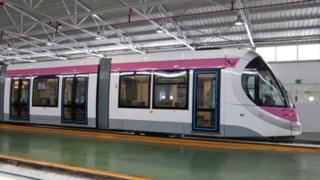DR JENIFER BAXTER, HEAD OF ENGINEERING AT THE INSTITUTION OF MECHANICAL ENGINEERS, SAID ABOUT UK TRANSPORT SECRETARY CHRIS GRAYLING’S COMMENTS THAT THE DECISION TO SCRAP ELECTRIFICATION BETWEEN CARDIFF AND SWANSEA WAS A DECISION TAKEN ON A “SIMPLE BASIS”:
“Electrification of this line will bring improved air quality, better energy efficiency of trains, reduced greenhouse gas emissions and an enhanced services. It is also a stretch of line that is used extensively and provides an economic link between the two main cities in South Wales.
“Unacceptably high costs for the Great Western electrification scheme have been given as the reason for scrapping the scheme, with costs rising from £874 million in 2013 to £2.8 billion in 2015. At today’s prices, this is seven times the cost of British Rail’s electrification of the East Coast route.[i] For this reason Government has cut back this electrification and, wrongly, claims that its benefits can be delivered by bi-mode trains.
“Bi-mode trains are designed to operate on both electrified lines and non-electrified lines. Those currently being introduced on Great Western and East Coast routes are able to switch between the electric powered mode and an on board diesel powered engine. However, while flexible, the electric-diesel bi-mode train suffers with increased emissions when operating in diesel mode, has higher fuel, capital and maintenance costs than pure electric trains and are less powerful when working in diesel mode (8.6 kw/tonne) compared with electric mode (11.2 kW/tonne). [ii] Bi-mode trains offer a solution to non-electrified lines and reduce the requirement to invest in electrification, but do not provide the required performance or offer the most efficient or environmentally friendly solution.
“In our report A Breath of Fresh Air: New Solutions to Reduce Transport Emissions [1], we recommended that the Department for Transport instruct Network Rail to develop an appropriate specification for railway electrification, which will achieve an affordable business case for rolling programme to complete the electrification of main lines between Britain’s principal cities and ports, and of urban rail networks through our major city centres. As the pollution within our cities continues to cause health problems and climate change becomes increasingly evident across the globe, this is now an urgent requirement.”
Help keep news FREE for our readers
Supporting your local community newspaper/online news outlet is crucial now more than ever. If you believe in independent journalism, then consider making a valuable contribution by making a one-time or monthly donation. We operate in rural areas where providing unbiased news can be challenging. Read More About Supporting The West Wales Chronicle


























